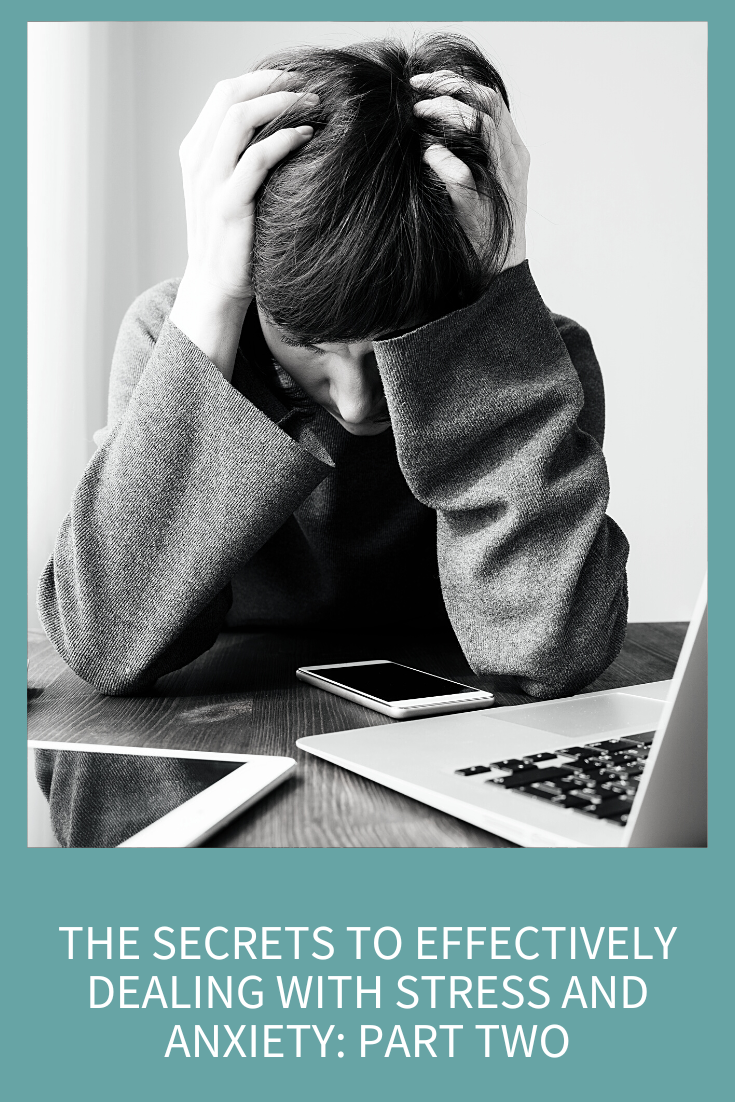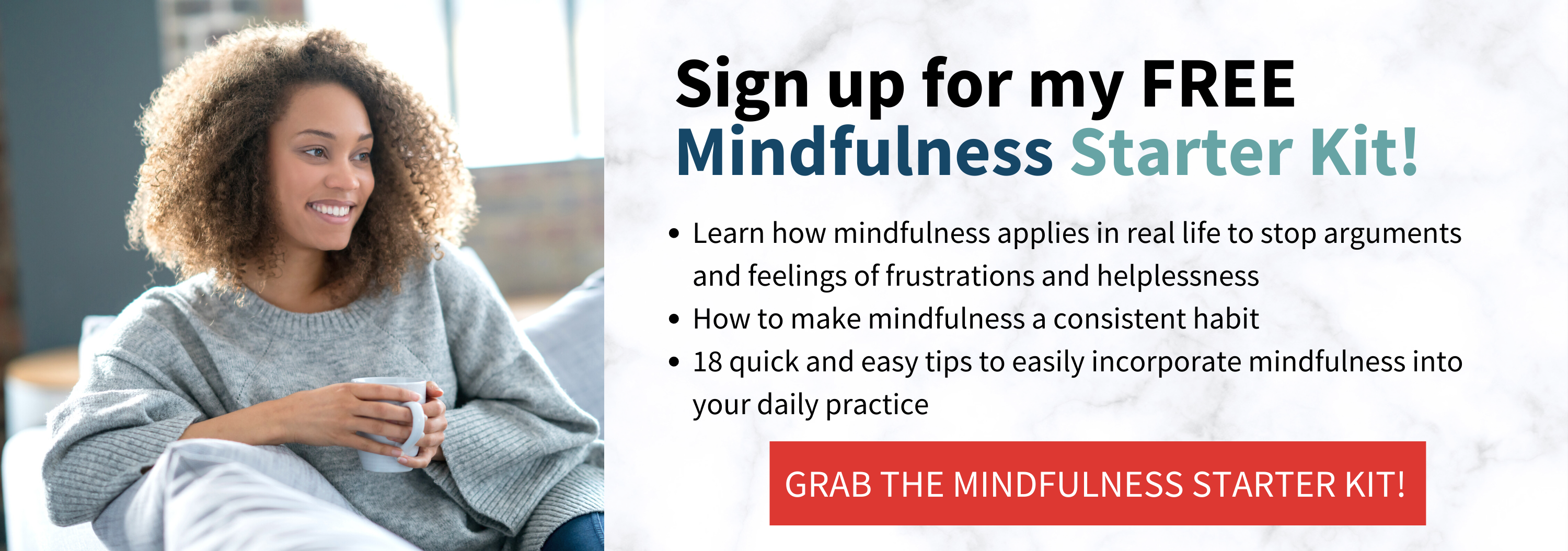
Last week I taught you the key difference between stress and anxiety and my top seven tips for effectively dealing with stress. You learned that while stress and anxiety are linked, they’re actually two different states of being, and what you do to alleviate stress can actually make you more anxious! This week, we’re focusing on my top tips to effectively tackle anxiety, so stay tuned to learn everything you need to know to reduce your anxiety and start living a more peaceful, joyful life.
9-minute read
Difference between stress and anxiety
As I mentioned last week, stress is a response to an external cause and recedes once that external issue is resolved. Anxiety, on the other hand, is a reaction to stress, and it’s an internal issue. Anxiety is a persistent or excessive worry that doesn’t go away, even when the stressor is no longer there. Since stress can trigger anxiety, keeping your stress level as low as possible is the first rule of thumb when dealing with anxiety. If you haven’t checked out my top seven ways to effectively manage your stress, get to that as soon as possible.
When we’re under stress, our brains and bodies have a series of chemical reactions affecting the brain and body. When we feel anxiety, it’s like our brains are hijacked to a whole new level. This is why what you do to deal with stress is different than what you do to deal with anxiety.
Let’s Talk Biology
I want to take a minute and talk about some of the biology going on so you can better understand and value the tips I’m about to give. Some tips might seem silly or strange if you don’t understand why they’re needed.
You have a nervous system that is made up of the brain, spinal cord, and all the nerves. Your nerves send messages between your brain and the rest of your body. Your nervous system is actually made up of two different nervous systems: voluntary and involuntary. You use your voluntary nervous system any time you control your body movements (like waving your hands or talking). Your involuntary nervous system is the one you’re not in control of and is in charge of things like digestion, breathing, and salivating.
That involuntary nervous system (INS) has two different nerve pathways: relaxed and emergency. When there’s anything your brain perceives as a threat, your INS Emergency system takes over:
- Stress Hormones flood your system with a burst of energy (to run)
- You might get a sinking feeling in your belly
- Your heart beats faster to pump more blood
- Your breathing becomes more shallow & faster to take in more air
- You might start sweating and
- Your pupils become bigger (to see in the dark)
This response was all well and good a million years ago when we were running from predators, but now it gets in the way. Imagine you’re at work at 8:00am, and your boss says she wants to see you at 2:00pm. Or imagine noticing your partner seems grumpy in the morning, and you ask them if they’re OK, and they tell you they’re not but need to get to work, so they’ll speak to you later.
Yes! You can feel your stomach sink as your brain goes into overdrive, wondering what’s wrong. You try to keep busy doing other things, but your brain keeps pulling you back to the situation that has you upset. This is because you weren’t supposed to stop thinking about the tiger trying to eat you!
A million years ago, running from a predator would have burned off the stress hormones being dumped into your system as you ran for your life. But in today’s scenarios of chronic stress, you’re not physically running from anything, so those stress hormones don’t burn off. Instead, they keep rushing through your body, and that stress becomes anxiety.
This is the reason that tips for stress don’t often work for anxiety. Because your brain is hijacked, it’s all about releasing your brain from that state first and then using your other great problem-solving tools.
My Top Five Tips for Dealing with Anxiety
Tip #1: Seek Help
While there’s no diagnosis related to having stress, there is a mental health diagnosis for anxiety (actually, there are a bunch of them, such as social anxiety disorder, panic disorder, and agoraphobia, to name a few). The Diagnostic and Statistical Manual for Mental Disorders (DSM-5-TR) has specific criteria that a qualified mental health professional would use to make a formal anxiety diagnosis. I’m going to mention those criteria here but want to be clear that you should never diagnose yourself. If you’re concerned, you should make an appointment to meet with a psychiatrist or other qualified mental health professional.
The symptoms for generalized anxiety disorder include:
- Excessive anxiety and worry, occurring more days than not for at least six months, about a number of events or activities (such as work or school performance)
- The individual finds it difficult to control worry
- The anxiety and worry are associated with three or more of the following six symptoms (with at least some symptoms having been present for more days than not for the past six months):
- Restlessness or feeling keyed up or on edge
- Being easily fatigued
- Difficulty concentrating or mind going blank
- Irritability
- Muscle tension
- Sleep disturbance (difficulty falling or staying asleep, or restless, unsatisfying sleep)
- The anxiety, worry, or physical symptoms cause clinically significant distress or impairment in social, occupational, or other important areas of functioning
- The disturbance is not attributable to a substance (alcohol or drugs) or another medical condition (hyperthyroidism)
- The disturbance isn’t better explained by another mental disorder
There are medications that can also help if you’re diagnosed with an actual anxiety disorder, but these should only be prescribed along with behavioral interventions (such as the tips here and talk therapy).
Antidepressants can be effective. SSRIs such as Lexapro (escitalopram), Celexa (citalopram), Zoloft (sertraline), Paxil (paroxetine), and Prozac (fluoxetine) are commonly prescribed. Other antidepressants called SNRIs (serotonin and norepinephrine reuptake inhibitors) are also prescribed, such as Cymbalta (duloxetine) or Effexor (venlafaxine)
Benzodiazepines such as Ativan, Xanax, Klonopin, and Valium can also be prescribed for immediate relief of a panic attack. These medications are highly addictive, so should be used sparingly and only used if prescribed. The generics of all of these types of drugs usually end with “pam,” such as alprazolam (Xanax), clonazepam (Klonopin), lorazepam (Ativan), and diazepam (Valium).
Other commonly prescribed meds include antihistamines like Vistaril or hydroxyzine, beta-blockers like propranolol, and gabapentin (Neurontin, which is actually an anti-seizure medication). These are generally used only for mild cases of anxiety.
Tip #2: Mindfulness and Guided Visualizations
To lower stress, there’s nothing better than getting into a regular meditation routine. But if you’ve passed stress and you’re anxious, trying to meditate can make you more anxious! This can be especially true for people who have unhealed or undischarged past trauma. Making mindfulness a habit and getting into a practice with guided visualizations is so important if you’re looking to lower your anxiety.
Tip #3: Explosive Cardio
Exercise is wonderful for stress and anxiety, but the type of exercise you do is important. Riding your bike or going on long runs is a great stress reliever but not always great for anxiety, as all that time to think can get you even more amped up. For anxiety, think of explosive exercise to burn off those stress hormones I mentioned earlier, such as jumping rope as fast as you can for 30-second intervals, box jumps for one minute, or other interval training where there are short bursts of very intense cardio.
Tip #4: Grounding Techniques
Grounding exercises are evidence-based tools to help you come back to the present moment instead of being caught up in fear. Many of these techniques use one or more of your five senses to “ground” you in the here and now, where you’re safe. Grounding techniques help you come back from rumination, negative thinking, and/or flashbacks. When you use grounding techniques, they decrease the intensity of what you’re feeling and help you detach from your anxious thoughts.
I’ve got a list of grounding techniques that you can download. But a couple of examples are:
- Pick a color: Picking a color and then naming everything you see in that color.
- 5-4-3-2-1: In this exercise, you name five things you can see, four things you can touch, three things you can hear, two things you can smell, and one thing you can taste.
- Describe an object: Pick up any object in your immediate space and start describing it in detail.
Grab my Free Grounding Exercises!
Tip #5: Vagus Nerve Activation
Your vagus nerve is the main orchestrator of the autonomic or involuntary nervous system (your relaxed or emergency responses) I described earlier. The vagus nerve is the longest nerve in your body. It goes from the brainstem all the way to your abdomen. Its job is to monitor and receive information about how your internal organs are functioning and to coordinate your body’s responses to keep you safe while also warning you about any danger before you even have a chance to think about it.
Let’s say you’re at a party. Your brain is scanning for threats (it’s possible your ex is going to be here), as well as for safety (your best friend is also supposed to show up as moral support in case your ex has the nerve to show their face)! If you even think you see your ex’s face in the crowd, your heart might race, or you might feel like you’re going to throw up. Your vagus nerve is making that happen. But then you see your friend walking toward you, and your breathing slows, and your body relaxes. That sigh and feeling of calm are also your vagus nerve doing its job.
I tell clients that you can think of the vagus nerve as being your body’s natural valium when it’s in a relaxed state (which is your default, believe it or not) and the body’s drama queen when it’s in an emergency state. What’s important is to know that you can activate your vagus nerve’s relaxed response, and you can do that relatively quickly and easily through breathwork and progressive relaxation exercises.
I think I’m going to do an entire episode soon on this vagus nerve and tips for turning on your relaxed response, but for now, I’ll teach you how to do diaphragmatic or belly breathing. You’re going to place one hand on your stomach and your other hand on your chest. As you slowly breathe in through your nose, feel the hand on your stomach rise (the hand on your chest shouldn’t be moving). Exhale slowly through your mouth as your stomach constricts and lays flat again. Breathing this way lowers your heart rate and blood pressure.
Subscribe today to get my love letter to you! This biweekly reminder will keep you on the path to creating connected, happy relationships (especially the one with yourself!).
Resources for Effectively Dealing with Stress and Anxiety: Part Two
The Secrets to Effectively Dealing with Stress and Anxiety: Part One
How Meditation Benefits Your Relationships (And There’s an Easy Way to Learn!)
You Might Not Realize You’re Suffering from Unhealed Trauma
How to Make Mindfulness A Habit
Loving Kindness Guided Meditation
Research for Effectively Dealing with Stress and Anxiety: Part Two
Diagnostic and Statistical Manual of Mental Disorders, Text Revision Dsm-5-tr 5th Edition by American Psychiatric Association







